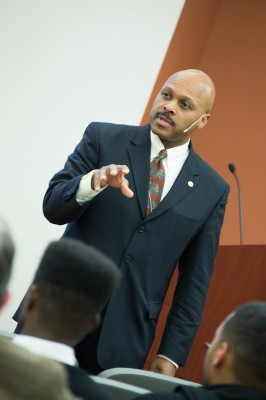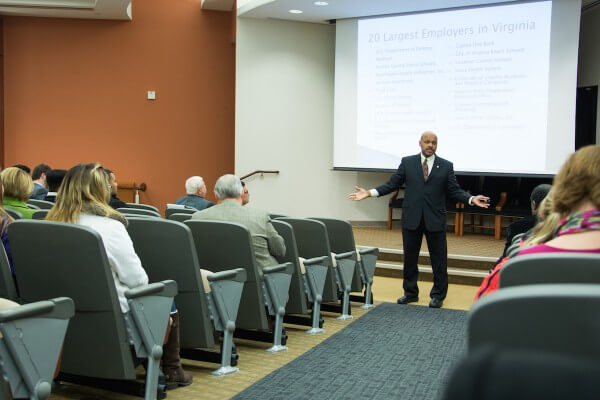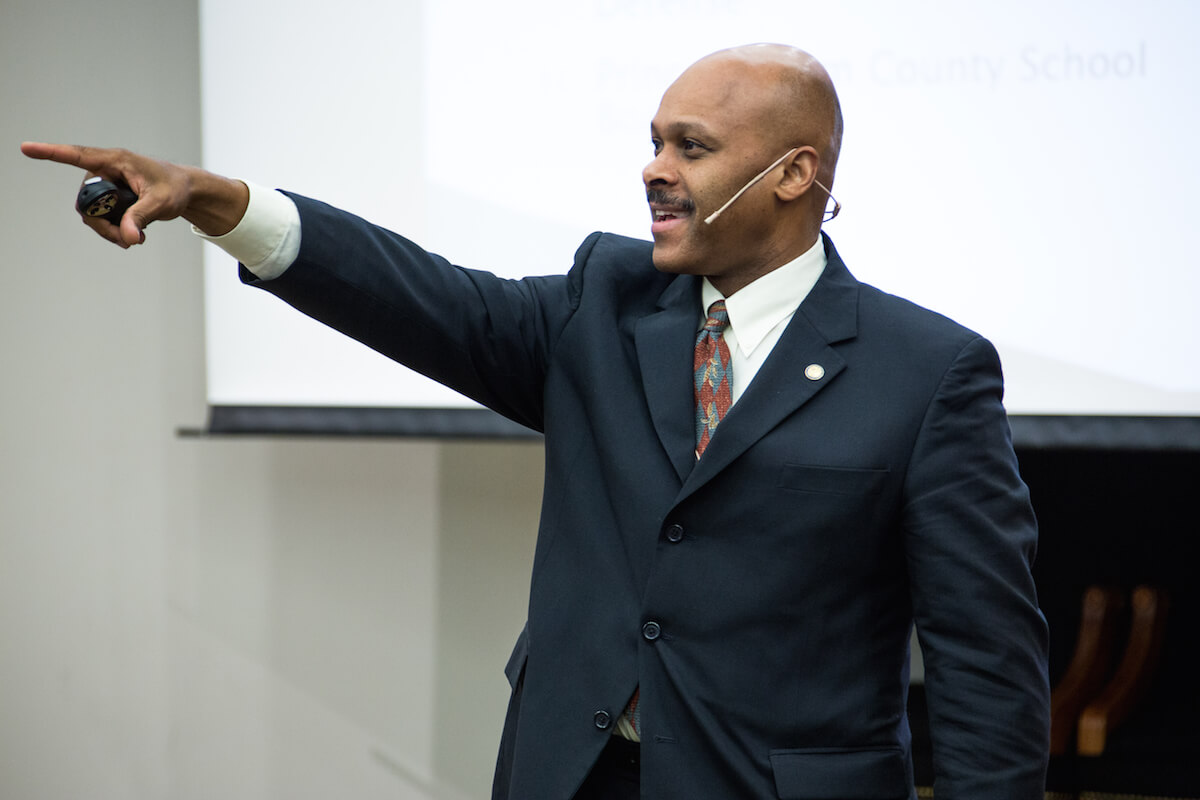Photos by Caleb Forsythe/ Shenandoah University
Ask Virginia Secretary of Commerce and Trade Maurice Jones what he would do if he could do only one thing to improve the state’s economy and he has a ready answer.
“I would have every business in the state have an apprenticeship program,” he said as the guest lecturer at Shenandoah University’s Harry F. Byrd Jr. School of Business Distinguished Lecture Series on Tuesday. “It’s a great way to provide on-the-job training for our people and for our businesses to establish a pipeline of talent … It would make our talent the most work ready talent in the world.”
But, Jones conceded, “The world isn’t mine. My 12-year-old daughter tells me that every day.”
 Jones gave a brief presentation on “The State of the Commonwealth” as part of the business school’s Entrepreneurship Week, before fielding questions from several of the roughly 75 people who attended the talk at Stimpson Auditorium in Halpin-Harrison Hall.
Jones gave a brief presentation on “The State of the Commonwealth” as part of the business school’s Entrepreneurship Week, before fielding questions from several of the roughly 75 people who attended the talk at Stimpson Auditorium in Halpin-Harrison Hall.
Jones was appointed secretary of commerce and trade by new Gov. Terry McAuliffe in January. He previously served as deputy secretary for the U.S. Department of Housing and Urban Development from April 2012 through January 2014.
“He gave some basic insight into what Virginia faces,” said software developer John Elrick of Winchester. “Some were pretty obvious, but he reflected some information where I didn’t know how bad it was, such as Virginia’s dependency on federal and public sector jobs.”
Of the 20 largest employers in the commonwealth, 13 are in the public sector, said Jones, and Virginia’s growth rate has been slow because of its reliance on the public sector. The state is growing its low-wage jobs at four times the rate it’s growing it’s high-wage jobs.
It is a risk to the commonwealth, he said, but it’s also a big opportunity to diversify and grow the private sector.
 Jones listed five areas he believes the commonwealth should focus on to diversify. There must be a focus on building adequate infrastructure, creating a positive business climate, encouraging more people to start businesses, on what local businesses already excel at and growing in those areas and educating and recruiting talented workers.
Jones listed five areas he believes the commonwealth should focus on to diversify. There must be a focus on building adequate infrastructure, creating a positive business climate, encouraging more people to start businesses, on what local businesses already excel at and growing in those areas and educating and recruiting talented workers.
He also emphasized educating students in the areas of math, technology, engineering and science.
“That’s really the sweet spot,” he said.
Jones also emphasized the “incredible array of assets” the commonwealth has. It has a stable 6 percent corporate tax rate — one of the lowest in the nation — that has not risen since 1972.
He also praised the Port of Virginia, one of the deepest ports on the East Coast, as being integral to the commonwealth’s commerce, as well as its central location. Virginia is within a 10-hour drive of 60 percent of the nation’s population.
He also cited the state’s 5.6 percent unemployment rate, which is lower than the nation’s 5.8 percent and the southeast’s 6.8 percent, as proof of the strength of Virginia’s economy.
When asked what the biggest problem facing the Shenandoah Valley is, Jones said the area’s tough competition.
“When people think of northern Virginia (NOVA), they think of the D.C. area and they want to flock there,” he said. “There’s a lot of noise in this area, and it’s centered around the D.C. area. How do you make the northern Shenandoah Valley stand out in that noise?”
Answering his own question, he said “There are plenty of opportunities…I believe the biggest opportunities for advancement in technology are not in NOVA. They are in rural Virginia — cheaper land, cheaper labor.”
He cited Mecklenburg County in southern Virginia, which he said is the largest data center in the world for Microsoft.
Shenandoah University senior Rachel Coffin, a business major, said, “It opens our eyes where all the jobs are. We can kind of focus our job search. It was also good to see we can be a part of the change to improve Virginia’s economy. Just attending tonight prepared me more.”
— Contact Amy Alonzo at aalonzo@winchesterstar.com
By AMY ALONZO The Winchester Star
REPRINTED WITH PERMISSION OF The Winchester Star




